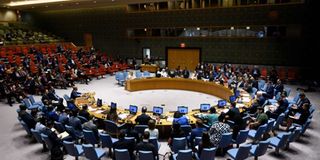Kenya has the right credentials for UN seat

A past United Nations Security Council meeting in New York in 2019. PHOTO | JOHANNES EISELE | AFP
What you need to know:
- Kenya has and continues to work on global multilateral projects.
- Kenya is persuaded that global challenges are only surmountable if the world deployed consensus.
On June 17, 2020, the United Nations will elect five states from its 193 members to take up the non-permanent seats at the United Nations Security Council (UNSC) for the period 2021-22.
Kenya will be on the ballot vying for the single seat available for Africa, having been endorsed by the African Union in August, 2019 as the AU candidate for the position.
Kenya is persuaded that global challenges are only surmountable if the world deployed consensus.
The 10-point Agenda that Kenya promises to champion in the Security Council is largely premised on the global sustainable development goals.
MULTILATERAL DIPLOMACY
The process leading-up to the adoption of the SDGs involved multilateral diplomacy at its best, demonstrated by building of bridges between diametrically opposing opinions, resulting in some of the most profound commitments ever by UN member states. Kenya was at the very centre of this process.
In 2013-2014, the world entrusted Kenya and Hungary with co-facilitation of the international negotiation process that created the SDGs. The mandate was clear, but the task was not easy.
The end of the SDGs’ formation ushered in deliberations on the Post-2015 development Agenda in September 2014.
Because of its impressive leadership in the SDGs’ process, Kenya was again appointed by the President of the 71st session of UN General Assembly to co-facilitate the 2030 UN Agenda design process together with Ireland.
The process successfully culminated in the adoption of the 2030 UN Agenda for sustainable development at a summit in New York in September 2015.
MULTILATERAL PROJECTS
Subsequently and as a follow-up, Kenya has and continues to work on global multilateral projects, such as the Sustainable Blue Economy Conference with Japan and Canada.
Kenya’s skills in multilateral diplomacy will be exemplified in the Security Council in at least three ways: First, Kenya will bring on board consensus building capabilities, more so within the context of unprecedented challenges occasioned by the global Covid-19 pandemic and other existential threats. Second, the council will benefit from Kenya’s objectivity and trustworthiness.
Third, Kenya’s consistency will bring in an element of certainty particularly on any Kenya-led agenda.
Kenya’s leadership in multilateral diplomacy has stood out. President Uhuru Kenyatta, who is the current chair of the Organisation of African, Caribbean and Pacific States and a member of the Bureau of African Union Heads of State and Government, has been engaging world leaders and institutions in proffering solutions for the Covid-19 pandemic.
The SDGs/2030 Agenda process is only one of many instances that showcase Kenya’s leadership in multilateral diplomacy.
The country has demonstrated thought and practical leadership in many other areas, which will be useful in the pursuit of the 10-point agenda once in the council.
Kenya is a safe pair of hands and stands ready to deliver on its promise as a non-permanent member of the United Nations Security Council. Kenya is ready to serve.
Mr Macharia Kamau is the Principal Secretary, Ministry of Foreign Affairs





